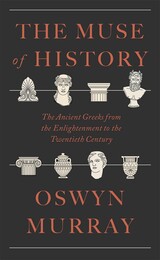
Within the space of three centuries leading up to the great Persian invasion of 480 BC, Greece was transformed from a simple peasant society into a sophisticated civilization that dominated the shores of the Mediterranean from Spain to Syria and from the Crimea to Egypt—a culture whose achievements in the fields of art, science, philosophy, and politics were to establish the canons of the the Western world.
Oswyn Murray places this remarkable development in the context of Mediterranean civilization. He shows how contact with the East catalyzed the transformation of art and religion, analyzes the invention of the alphabet and the conceptual changes it brought, describes the expansions of Greece in trade and colonization, and investigates the relationship between military technology and political progress in the overthrow of aristocratic governments.

Ancient Greek thought is the essential wellspring from which the intellectual, ethical, and political civilization of the West draws and to which, even today, we repeatedly return. In more than sixty essays by an international team of scholars, this volume explores the full breadth and reach of Greek thought--investigating what the Greeks knew as well as what they thought about what they knew, and what they believed, invented, and understood about the conditions and possibilities of knowing. Calling attention to the characteristic reflexivity of Greek thought, the analysis in this book reminds us of what our own reflections owe to theirs.
In sections devoted to philosophy, politics, the pursuit of knowledge, major thinkers, and schools of thought, this work shows us the Greeks looking at themselves, establishing the terms for understanding life, language, production, and action. The authors evoke not history, but the stories the Greeks told themselves about history; not their poetry, but their poetics; not their speeches, but their rhetoric. Essays that survey political, scientific, and philosophical ideas, such as those on Utopia and the Critique of Politics, Observation and Research, and Ethics; others on specific fields from Astronomy and History to Mathematics and Medicine; new perspectives on major figures, from Anaxagoras to Zeno of Elea; studies of core traditions from the Milesians to the various versions of Platonism: together these offer a sense of the unquenchable thirst for knowledge that marked Greek civilization--and that Aristotle considered a natural and universal trait of humankind. With thirty-two pages of color illustrations, this work conveys the splendor and vitality of the Greek intellectual adventure.

How the modern world understood the ancient Greeks and why they matter today.
The study of ancient Greece has been central to Western conceptions of history since the Renaissance. The Muse of History traces the shifting patterns of this preoccupation in the last three centuries, in which successive generations have reinterpreted the Greeks in the light of their contemporary worlds. Thus, in the eighteenth century, the conflict between Athens and Sparta became a touchstone in the development of republicanism, and in the nineteenth, Athens came to represent the democratic ideal. Amid the ideological conflicts of the twentieth century, the Greeks were imagined in an age of suffering, inspiring defenses against nationalism, Nazism, communism, and capitalism.
Oswyn Murray draws powerful conclusions from this historiography, using the ever-changing narrative of ancient Greece to illuminate grand theories of human society. Analyzing the influence of historians and philosophers including Hegel, Burckhardt, Nietzsche, and Braudel, Murray also considers how coming generations might perceive the Greeks. Along the way, The Muse of History offers rare behind-the-scenes glimpses of figures who shaped the study of ancient Greece, some devotedly cited to this day and others forgotten. We sit in on a class with Arnaldo Momigliano; meet Moses Finley after his arrival in England; eavesdrop on Paul Veyne, Jean-Pierre Vernant, and Pierre Vidal-Naquet; and rediscover Michel Foucault.
A thrilling work that rewrites established scholarly traditions and locates important ideas in unexpected places, The Muse of History reminds us that the meaning of the past is always made in and for the present.
READERS
Browse our collection.
PUBLISHERS
See BiblioVault's publisher services.
STUDENT SERVICES
Files for college accessibility offices.
UChicago Accessibility Resources
home | accessibility | search | about | contact us
BiblioVault ® 2001 - 2024
The University of Chicago Press









